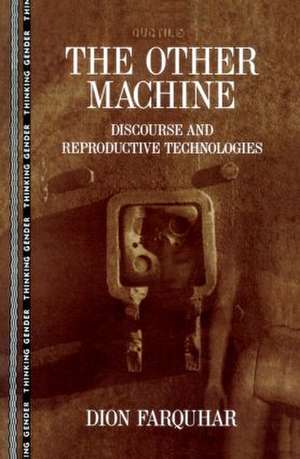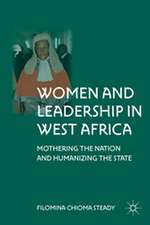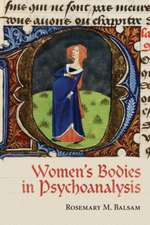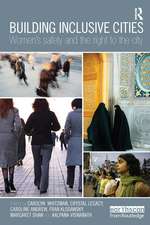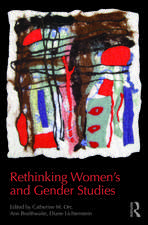The Other Machine: Discourse and Reproductive Technologies: Thinking Gender
Autor Dion Farquharen Limba Engleză Paperback – 9 oct 1996
Farquhar argues that two perspectives have tended to dominate feminist discussions of these issues. She labels these: "fundamental feminism" and "market liberalism." By linking a theoterical approach with a practical set of issues, Farquhar's The Other Machine provides a rigorous analysis of contemporary feminist debates.
Din seria Thinking Gender
-
 Preț: 385.55 lei
Preț: 385.55 lei -
 Preț: 399.45 lei
Preț: 399.45 lei -
 Preț: 380.07 lei
Preț: 380.07 lei -
 Preț: 332.19 lei
Preț: 332.19 lei -
 Preț: 424.16 lei
Preț: 424.16 lei -
 Preț: 391.39 lei
Preț: 391.39 lei - 15%
 Preț: 492.75 lei
Preț: 492.75 lei -
 Preț: 448.49 lei
Preț: 448.49 lei -
 Preț: 411.42 lei
Preț: 411.42 lei -
 Preț: 476.01 lei
Preț: 476.01 lei -
 Preț: 408.45 lei
Preț: 408.45 lei - 15%
 Preț: 432.12 lei
Preț: 432.12 lei -
 Preț: 420.34 lei
Preț: 420.34 lei -
 Preț: 388.42 lei
Preț: 388.42 lei -
 Preț: 368.98 lei
Preț: 368.98 lei -
 Preț: 391.39 lei
Preț: 391.39 lei -
 Preț: 367.07 lei
Preț: 367.07 lei -
 Preț: 432.29 lei
Preț: 432.29 lei -
 Preț: 427.93 lei
Preț: 427.93 lei - 5%
 Preț: 231.67 lei
Preț: 231.67 lei -
 Preț: 362.82 lei
Preț: 362.82 lei
Preț: 118.94 lei
Preț vechi: 166.30 lei
-28% Nou
Puncte Express: 178
Preț estimativ în valută:
22.76€ • 24.80$ • 19.18£
22.76€ • 24.80$ • 19.18£
Carte tipărită la comandă
Livrare economică 23 aprilie-07 mai
Preluare comenzi: 021 569.72.76
Specificații
ISBN-13: 9780415912792
ISBN-10: 0415912792
Pagini: 270
Dimensiuni: 152 x 229 x 15 mm
Greutate: 0.5 kg
Ediția:New.
Editura: Taylor & Francis
Colecția Routledge
Seria Thinking Gender
Locul publicării:Oxford, United Kingdom
ISBN-10: 0415912792
Pagini: 270
Dimensiuni: 152 x 229 x 15 mm
Greutate: 0.5 kg
Ediția:New.
Editura: Taylor & Francis
Colecția Routledge
Seria Thinking Gender
Locul publicării:Oxford, United Kingdom
Notă biografică
Dion Farquhar is a political theorist, cultural critic, poet and prose fiction writer living in Santa Cruz.
Recenzii
"Farquhar's text is intellectually rigorous and provocative..." -- Majia Holmer NadesanPhilosophy in Review
"This brilliant and visionary study steers a course between, on the one hand, the conventional Sunday supplement celebrations of reproductive technologies' miracles of modern medicine' and, on the other, the demonology of much of feminist critique whereby power and profit-hungry (male) doctors foist useless or dangerous procedures on gullible, desperate (female) patients. Farquhar argues compellingly that both discourses, mired in conventional notions of reproduction, are blind to the revolutionary potential of these technologies to transform radically our ideas of maternity, parenthood, family, and kinship
." -- Sandra Lee Bartky, University of Illinois at Chicago
"Dion Farquhar has produced a dynamic and provocative analysis of the incredible complexity of issues, values and emotions involved in understanding and assessing assisted reproductive technologies (ARTs). Avoiding the more common course of either accepting these technologies with open arms as a means of granting childless couples a baby or rejecting them as tampering with nature, this book instead explores the ways in which these technologies open up and challenge our understanding of sexuality, reproduction, parenting and kinship. It explores with great sublety and sensitivity the liminal space between biology and science, nature and culture, and freedom and restraint." -- Elizabeth Grosz, Monash University
"This brilliant and visionary study steers a course between, on the one hand, the conventional Sunday supplement celebrations of reproductive technologies' miracles of modern medicine' and, on the other, the demonology of much of feminist critique whereby power and profit-hungry (male) doctors foist useless or dangerous procedures on gullible, desperate (female) patients. Farquhar argues compellingly that both discourses, mired in conventional notions of reproduction, are blind to the revolutionary potential of these technologies to transform radically our ideas of maternity, parenthood, family, and kinship
." -- Sandra Lee Bartky, University of Illinois at Chicago
"Dion Farquhar has produced a dynamic and provocative analysis of the incredible complexity of issues, values and emotions involved in understanding and assessing assisted reproductive technologies (ARTs). Avoiding the more common course of either accepting these technologies with open arms as a means of granting childless couples a baby or rejecting them as tampering with nature, this book instead explores the ways in which these technologies open up and challenge our understanding of sexuality, reproduction, parenting and kinship. It explores with great sublety and sensitivity the liminal space between biology and science, nature and culture, and freedom and restraint." -- Elizabeth Grosz, Monash University
Cuprins
Chapter 1 Introduction; Chapter 2 ARTs of Discourse: Donors, Dads, Mothers, and others; Chapter 3 Cyborg Conceptions: How Technologies Mark Bodies; Chapter 4 Liberal Discourses: Popular and Medical; Chapter 5 Fundamentalist Discourses: Feminist and Secular; Chapter 6 Conception in the Lab: In Vitro Fertilization; Chapter 7 Surrogate Mothers: Victims or Monsters?; Chapter 8 Prenatal Technologies: Ultrasound and Amniocentesis; Chapter 9 (M)Other Discourses;
